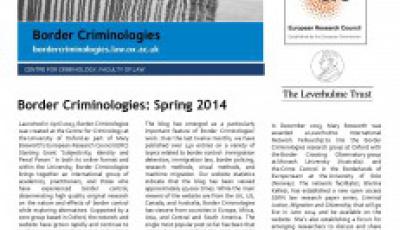Launched in April 2013, Border Criminologies was created at the Centre for Criminology at the University of Oxford as part of Mary Bosworth’s European Research Council (ERC) Starting Grant ‘Subjectivity, Identity and Penal Power.’ In both its online format and within the University, Border Criminologies brings together an international group of academics, practitioners, and those who have experienced border control, disseminating high quality original research on the nature and effects of border control while exploring alternatives. Supported by a core group based in Oxford, the network and website have grown rapidly and continue to evolve as new researchers join in and content is added.

The blog has emerged as a particularly important feature of Border Criminologies’ work. Over the last twelve months, we have published over 140 entries on a variety of topics related to border control: immigration detention, border policing, research methods, visual methods, and maritime migration. Our website statistics indicate that the blog has been viewed approximately 50,000 times. While the main viewers of the website are from the UK, US, Canada, and Australia, Border Criminologies has viewers from countries in Europe, Africa, Asia, and Central and South America. The single most popular post so far was written by recent Oxford BCL graduate Celia Rooney: ‘The UK Immigration Act 2014: Last minute amendments – too little too late?’
In addition to the blog, we have extended the online presence of Border Criminologies through social media, with multiple tweets on Twitter and posts on Facebook. As part of our focus on visual methods, we are amassing images of border control on Flickr. We have also posted twelve podcasts onto our University iTunes account.
In December 2013, Mary Bosworth was awarded a Leverhulme International Network Fellowship to link the Border Criminologies research group at Oxford with the Border Crossing Observatory group at Monash University and the Crime Control in the Borderlands of Europe team at the University of Oslo. The network facilitator, Blerina Kellezi, has established a new open access SSRN law research paper series, Criminal Justice, Migration and Citizenship, that will go live in June 2014 and be available on the website. She is also establishing a forum for emerging researchers to discuss and share research methods and experiences.
Members of the Border Criminologies group in Oxford and elsewhere were active in research and publication throughout 2013/14, presenting on their research in a variety of academic and professional venues. Examples of their publications can be found on the Research Publications page, while accounts of some of their research activity can be found on the Current Research page. Details about their teaching in this field can be found on the teaching Syllabi page, while examples of survey instruments can be found on the Research Surveys page.
Border Criminologies has also been active in hosting events and speakers. In March 2014 we held a two one-day events on foreign national prisoners and everyday life in immigration detention. A selection of the talks can be found on iTunes, while some of the papers from the foreign national prisoners event will appear in a 2015 special issue of Criminology & Criminal Justice.
Looking ahead
We have several goals in mind for the next academic year. We will continue to build content on the website, with a specific focus on three main areas:
- teaching resources for criminology courses on border control, migration, and mobility;
- creating a postdoctoral research network; and
- creating a professional network for NGOs.
We will include more information about the research of the network members and create a blog for detainees, ex-prisoners, and those with experience of border control. Sarah Turnbull, who is currently conducting research on immigration detainees’ perspectives on home and belonging, has started to hand out cameras to women and men leaving detention, to record what happens next. The first photo essay from this project appeared as an entry on the blog in early 2014, while later images will be collated for further academic analysis. Combined with images taken in detention centres by members of Border Criminologies, these may form the basis of a future exhibition.
As part of our commitment to methodological innovation, we are in the process of establishing an Immigration Detention Archive. This archive which will initially be digitised, will draw together a range of objects, from music CDs (produced with detainees by Music in Detention), to institutional cookbooks, detainee art work, institutional and personal photographs, letters, and other ephemera. It will pool items from academic researchers, custodial companies, and NGOs to create a resource for current and future researchers.
We continue to experiment with new methods and modes of communication, reaching out to colleagues around the world. Alongside these web-based interactions, network members remain active in research and publications in more traditional academic arenas as well. As we move forward, we welcome comments, suggestions, and participation in these endeavours. We would like to thank everyone who contributed to Border Criminologies over its first year and to those of you who follow the blog and Border Criminologies through social media.
Mary, Ines, and Sarah
Keywords:
Share:








